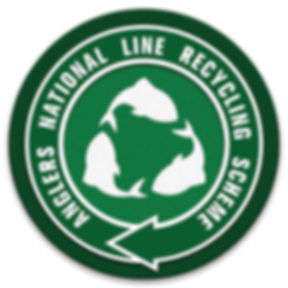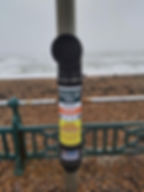
SUSSEX COAST PROJECT 2021
Sussex Coast Pipe Bin Project
In late 2020 we installed a small number of pipe bins at selected popular fishing spots in Sussex and the amount of line and tackle collected was significant. We found that the general public were putting a lot of commercial net fragments in the
bins and these out -numbered recreational items significantly hence the interest in carrying out a study.
Very soon after this Leave No Trace Brighton approached us to help get some more bins along the sea front there. With the financial support of Brighton City Council, they were soon in place and filling with net fragments and line far quicker than expected. In 3 weeks over 165kgs were deposited in the bins by the public, giving us even more evidence of the amounts of fishing debris on our coastline. This drove us to seek funding via the Ocean Conservancy & Global Ghost Gear Initiative 2021 Small Grants fund in late February.
As a result of this application in mid March 2021 we were ecstatic to find out that we had been awarded just over £7,000 to carry out the yearlong study of commercial and recreational fishing litter along a large area of the Sussex coast. We are delighted that as part of the project we will be working with the support of the Sussex Wildlife Trust, who are actively involved in projects along the coastline and will be invaluable in terms of data analysis and the final report.
The project involves the installation of 28 pipe bins at selected points from Worthing to Pevensey across the south coast and will target 10 of the most frequently found items that originate directly from angling or commercial fishing activity. Within a few weeks of the project being launched we teamed up with the volunteers at Weymouth & Portland Marine Litter who installed 8 bins in Dorset and the materials collected have been included in the project result for the 12 months of the project.
The 4 objectives of the project are to:
Recover abandoned, lost or otherwise discarded commercial fishing gear (ALDFG) and recreational fishing gear.
Research and identify impacted sites, sources (commercial or recreational) and fishing method responsible for materials collected and create a complete data set for analysis.
Reduce by engaging with sources of Commercial and Recreational ALDFG, to discuss behavioural change, work practice solutions or alternative methods to reduce ALDFG & recreational fishing litter.
Recycle all materials collected during the project via ReFactory and once processed, install recycling stations for general plastic waste made from the project’s collections. Both anglers and the public are encouraged to collect discarded tackle and commercial fishing net debris then place it in our bins. Already the public, swimming groups, beach users and many dog walkers have taken the idea to their heart. They are collecting everywhere and grateful that, at long last, there is a proper solution to the litter they find on our beaches.
Several local groups and individuals have offered support to us, by sponsoring bins or by becoming pipe guardians assisting in emptying, bagging, and sorting the contents of all the bins.
Already involved in the project are the following Sussex organisations and groups;
-
Leave No Trace Brighton
-
The Deans Volunteers
-
Brighton & Hove City Clean
-
Brighton Inshore Fishing
-
Seaford Council
-
Newhaven Port Authority
-
Plastic Free Eastbourne
-
Pevensey Bay Residents
-
Wealdon Council
-
Seabirds Ltd
-
Fish 2 Water
-
The Tackle Box, Brighton
-
Brighton Premier Marina
-
Shoreham Harbour Arms Community Organisation
-
Adur Coastal Office
-
Splash Point Music
-
Sussex IFCA
-
Sussex Wildlife Trust
As always, the materials we collect through this project will be recycled by the team at ReFactory, using their unique processes, and will be turned into useful products that will help collect more plastic waste in future years along the Sussex coast.
A special thanks to both Ocean Conservancy and Global Ghost Gear Initiative for their support and funding of the project.
This is truly a remarkable achievement for the volunteer led and donation funded ANLRS. No doubt the full survey results will make interesting reading and we hope that the industry and local authorities will provide the funding we need to carry on
into 2022 and expand this across more counties and coastlines.
If any interested groups would like more information as to how they could start a similar pipe bin scheme in their local areas, then please drop us a message via the Contact Us page




